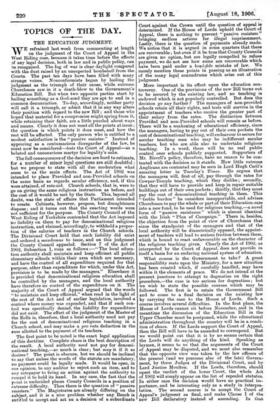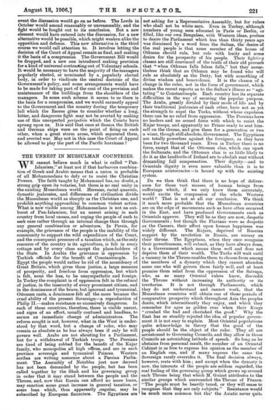TOPICS OF THE DAY.
THE EDUCATION JUDGMENT.
WE refrained last week from commenting at length on the judgment of the Court of Appeal in the West Riding case, because it takes time before the effects A any legal decision, both in law and in public policy, can be recognised. The fog of war is clear daylight compared with the dust raised by an unexpected bombshell from the Courts. The past ten days have been filled with many strange voices. Nonconformists began by bailing the judgment as the triumph of their cause, while, extreme Churchmen saw in it a death-blow to the Government's Education Bill. But when two opposite parties start by bailing something as a God-send they are apt to end in a common denunciation. To-day, accordingly, neither party will call it a triumph, or admit that it in any way alters their position with regard to the new Bill ; and those who hoped that material for a compromise might spring from it, while retaining their faith, are a little puzzled about ways and means. Clearly it does not meet all the points at issue ; the question is which points it does meet, and how the rest will be affected. The only person who is entitled to a modest satisfaction is the " passive resister." Instead of appearing as a contumacious disregarder of the law, he must now be considered—tests the Court of Appeal—as a belated and unconscious martyr for legality's sake.
The full consequences of the decision are hard to estimate, for a number of minor legal questions are still doubtful ; but we propose to state with all due moderation what seem to us the main effects. The Act of 1902 was intended to place Provided and non-Provided schools on the same basis as regards secular efficiency, and, if this were attained, of rate-aid. Church schools, that is, were to go on giving the same religious instruction as before, and the cost of it would be met by the State. This, beyond all doubt, was the state of affairs that Parliament intended to create. Cabinets, however, propose, but draughtsmen dispose ; and it turns out that the enacting words were not sufficient for the purpose. The County Council of the West Riding of Yorkshire contended that the Act imposed no liability on them to pay for denominational religious instruction, and claimed, accordingly, to withhold a propor- tion of the salaries of teachers in the Church schools. The Divisional Court held that such liability did exist and ordered a mandamus to issue, and on this judgment the County Council appealed. Section 7 of the Act of 1902, Subsection 1, runs as follows :—" The local educa- tion authority shall maintain and keep efficient all public elementary schools within their area which are necessary, and have the control of all expenditure required for that purpose, other than expenditure for which, under this Act, provision is to be made by the managers." Elsewhere it is provided that denominational religious education shall be controlled by the managers, and the local authority have therefore no control of the expenditure on it. The majority of the Court of Appeal argued that the words " to maintain and keep efficient," when read in the light of the rest of the Act and of earlier legislation, involved a control where money was expended, and that if such con- trol was specifically denied, the liability for expenditure did not exist. The effect of the judgment of the Master of the Rolls is, therefore, that a local authority need not pay for the cost of denominational religious teaching in a Church school, and may make a pro rata deduction in the sum allotted to the payment of its teachers.
The first point to be noted is the exact legal application of this doctrine. Complete chaos is the best description of the result. A local authority need not pay for denomi- national teaching,—so much is clear; but may it if it so desires ? The point is obscure, but we should be inclined to say that unless the words of the statute are mandatory, no payment could be legally made. It would be open, in our opinion, to any auditor to reject such an item, and to any ratepayer to bring an action against the authority to compel it to hold its hand. In any case, the fact that the point is undecided places County Councils in a position of extreme difficulty. Then there is the question of " passive resisters." The Magistrates are already differing on the subject, and it is a nice problem whether any Bench is entitled to accept and act on a decision of a subordinate Court against the Crown until the question of appeal is determined. If the House of Lords uphold the Court of Appeal, there is nothing to prevent " passive resisters" bringing endless actions for illegal imprisonment, Lastly, there is the question of payments already made. We notice that it is argued in some quarters that these are recoverable ; but even if it be true that County Councils are given no option, but are legally compelled to refuse payment, we danot see how sums are recoverable which, have been paid under a bond-fide mistake of law. We merely mention these points in passing as an illustration of the many legal conundrums which arise out of this judgment.
More important is its effect upon the education con- troversy. One of the provisions of the new Bill turns out to be secured by the existing law, and no teaching 'is endowed which is not popularly controlled. But does the decision go any further ? The managers of non-provided schools retain all their rights, and tests will survive in the appointment of teachers who receive the greater part of their salary from the rates. The distinction between Provided and non-Provided schools will remain as before. There will be a weakening of educational efficiency, since the managers, having to pay out of their own pockets the cost of denominational teaching, will endeavour to secure for secular teaching men who may be indifferent secular teachers, but who are able also to undertake religious teaching. In a word, there will be no real public control over schools publicly supported. Supporters of Mr. Birrell's policy, therefore, have no reason to be con- tented with the decision as it stands. How little extreme Anglicans are contented may be seen in Lord Hugh Cedirs amazing letter in Tuesday's Times. He argues that the managers will, first of all, pay through the rates for Cowper-Temple teaching, which they dislike ; secondly, that they will have to provide and keep in repair suitable buildings out of their own pockets ; thirdly, that they must pay the cost of denominational teaching in them. This " treble burden " he considers insupportable, and advises= Churchmen to pay the whole or part of their Education-rate into a new fund, to be used for religious teaching,—a novel form of "passive resistance" which. is almost identical with the Irish •" Plan of Campaign." There is, besides, the objection from the point of view of Churchmen that since the standpoint of the managers and that of the local authority will be diametrically opposed, the appoint- ment of teachers will lead to serious friction between them, which is bound to react unfavourably on, the character of the religious teaching given. Clearly the Act of 1902, as interpreted by the Court of Appeal, does not provide in itself a basis for an enduring national system of education.
What course is the Government to take? A great responsibility rests upon the Ministry, for a new situation has been created which, if carefully handled, may have within it the elements of peace. We do not intend at the present juncture to attempt to dogmatise on the right procedure,—the case is too serious for dogmatism ; but we wish to state the possible courses which may be followed. The first is to retain the Government Bill and to come to a final decision on the existing law by carrying the case to the House of Lords. Such a course involves several difficulties. In the first place, the House of Lords cannot sit before November, and in the meantime the discussion of the Education Bill in the Upper Chamber must be postponed, while the educational administration throughout the country will be in a condi: tion of chaos. If the Lords support the Court of Appeal, then the Bill will have to be amended to correspond. But we would point out that it is by no means certain that the Lords will do anything of the kind. Speaking as laymen, it seems to us that the arguments of the Court of Appeal may be disputed, and we must also remember that the opposite view was taken by the law officers of the present (and we presume also of the late) Govern-. ment, by three Judges of the Divisional Court, and by Lord Justice Moulton. If the Lords, therefore, should upset the verdict of the lower Court, the whole Act of 1902 will simply appear on the list of repealed statutes. In either case the decision would have no practical im- portance, and be interesting only as a study in interpre- tation. The second course is to accept the Court of Appeal's judgment as final, and make Clause I of the new Bill declaratory instead of amending. In that event the discussion would go on as before. The Lords in October would amend reasonably or unreasonably, and the fight would be fought out to its conclusion. But a new element would have entered into the discussion, for a new alternative would be possible, which might weaken alike the opposition and defence. This new alternative is the third course we would call attention to. It involves letting the decision of the Court of Appeal remain as final, and making it the basis of a compromise. The Government Bill would be dropped, and a new one introduced making provision for a kind of universal contracting out of Voluntary schools. It would be necessary to have the majority of the managers popularly elected, or nominated by a popularly elected body, in order to vindicate the central doctrine of the Government's policy, and some arrangements would have to be made for taking part of the cost of the provision and maintenance of the buildings from the shoulders of the managers. In some such scheme it seems to us there is the basis for a compromise, and we would earnestly appeal to the Government and the country during the temporary lull which the Recess gives to consider whether a long, bitter, and dangerous fight may not be averted by making use of this- unexpected peripeteia which the Courts have sprung upon us. It is said that once at Samoa the British and German ships were on the point of firing on each other, when a great storm arose, which separated them, and averted war. May not in this case the Court of Appeal be allowed to play the part of the Pacific hurricane ?



































 Previous page
Previous page